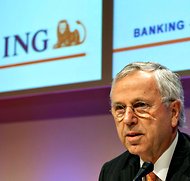 Toussaint Kluiters/United Photos — ReutersJan Hommen, chief of ING.
Toussaint Kluiters/United Photos — ReutersJan Hommen, chief of ING.
7:42 p.m. | Updated
LONDON — The Dutch financial services group ING said Friday that it would not pay a dividend to shareholders until it had repaid all of the state aid it received during the recent financial crisis.
ING’s chief executive, Jan Hommen, said the bank’s priorities over the next two years also include increasing its core Tier 1 capital ratio — a measure of a bank’s ability to weather financial shocks — to 10 percent, from 9.6 percent at the end of September, despite rising regulatory costs.
Updating investors on the bank’s strategy, Mr. Hommen said ING was focused on repaying the bailout from the Dutch government. In 2008, the firm received 10 billion euros, or $12.8 billion, from local authorities, and still has to repay 3 billion euros.
ING did not say when it would repay the state aid, other than “as soon as possible.” It also has to split up its banking and insurance assets by the end of 2013 to comply with requirements attached to the bailout.
“Given the ongoing crisis in the euro zone and increasing regulatory capital requirements, we need to take a cautious approach and pay special attention to liquidity, funding and capital,” Mr. Hommen said in a statement. “In 2011, market circumstances became increasingly difficult and volatile, and we expect that to remain the case in the near future.”
The company’s stock had fallen 2 percent by the close of trading in Amsterdam on Friday. ING’s share price has fallen 20.5 percent over the last 12 months.
ING also announced that it expected to save 300 million euros a year by 2015 through so-called procurement initiatives, which will look to centralize purchasing across the firm to reduce costs.
The Dutch company wants to reduce its cost-income ratio — a measure of a bank’s profitability — to 50 to 53 percent by 2015. The figure was 55.8 percent at the end of the third quarter of 2011.
“By managing our balance sheet more efficiently, ING will increase returns and grow customer lending without increasing the balance sheet,” Mr. Hommen said.
Like other European financial institutions, ING has been reducing its exposure to the Continent’s sovereign debt crisis. The Dutch firm reduced its holdings in Southern European sovereign debt by 1.2 billion euros in the fourth quarter of 2011, according to a company statement.
Last year, ING reduced its total exposure to these debt-ridden countries by 4 billion euros, but still has approximately 2 billion euros of Southern European sovereign debt on its balance sheet.
On Thursday, ING announced that it was abandoning plans for an initial public offering of its combined Asian and European businesses, citing turbulence in the equity markets.
The firm said it was now considering a sale of its Asian business, but still planned to pursue a separate I.P.O. for its European arm.
“Given the uncertain economic outlook and turbulent financial markets, especially in Europe, ING has decided to explore other options for its Asian insurance and investment management business,” Mr. Hommen said in a statement.
Article source: http://feeds.nytimes.com/click.phdo?i=fa2fc54132177134f7ef219aac872d06